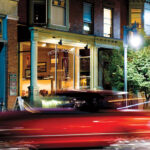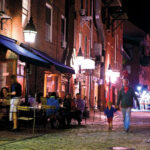No. 29: The food scene went underground
There’s a skit on the comedy show Portlandia (it satires the one in Oregon, but, really, all the same jokes apply) where, thanks to a newspaper write-up, the line for a new brunch place gets so long and populated it begins to feel like a tiny village unto itself. Anyone who’s waited for an hour at Hot Suppa!, Bintliff’s, or the Front Room for brunch on the weekend can relate. After word got out about the Portland food scene and Bon Appetit bestowed its “American’s Foodiest Small Town” award, the lines grew. While no one exactly complained, for many locals, the tight-knit culinary world they cherished became too visible. In response, they’ve taken it underground.
Pocket Brunch and Cloak & Dagger are two of Portland’s latest underground food clubs. They are held once a month and change themes, menus, even locations (and in the case of Pocket Brunch, chefs) for every event. There are no lines, but a limited number of spots. The process is simple: Sign up for their newsletters and respond quickly when tickets are announced or wait till next month.
“For a while Portland used to have a better underground network,” says Katie Shier-Potocki, who founded Pocket Brunch along with Joel Beauchamp and her husband, Josh, with whom she owns 158 Pickett St. Café. “Now, smaller, independent, underground places are popping up in response.” The most recent Pocket Brunch themes included Curiosities (“It was a mad scientist meets fortune tellers, weird sort of anything goes kind of event held at Nosh”) and Farm Hands (“Everyone eats with their hands, and you can guess the type of location”).
Cloak & Dagger, meanwhile, maintains a consistent chef (Local 188 line chef Erika Joyce), but changes its cuisine wildly month to month. Recently she held a twenty-three course “Dinner of the Gods” for twenty-two people over eight hours at the house of the owners of Standard Baking and has plans for themes such as “France v. Spain: Escoffier v. Adria” and “Feast of the Seven Fish.”
Both underground clubs are secretive, yet open to anyone. They exist so people can forge connections around the idea that there’s constantly something inventive and unexpected to enjoy in the world of Portland food. And wasn’t that the ultimate goal of the emerging foodie scene all along?
—Will Bleakley
No. 30: In the Telling Room, there are always new stories being told
by Deirdre Fulton
Two things are immediately apparent upon walking into the Telling Room, a second-floor space overlooking Commercial Street. The first is that this is a place that honors words. There are shelves of books stuffed with reading materials for kids of all ages, there is a stack of writing paper left out on the table, there are index cards inscribed with random words sticking to the whiteboard in the corner by the window.
The second thing is the warmth — not temperature, but tone. Throw rugs cover the hardwood floors; two couches are available for hanging out or curling up with a book. The brick walls are adorned with remnants of past projects. The Telling Room, an eight-year-old nonprofit writing center, may have been started by award-winning writers and receives support from institutions like the National Endowment for the Arts, but this big, open room doesn’t feel stuffy. It’s a place where kids can feel comfortable asking questions, getting silly, and doing what, in other areas of their lives, may seem indulgent: telling their own stories.
Emmanuel was one of those kids — barely a kid anymore, he was sixteen when I met him through the Telling Room’s Young Writers and Leaders program, an intensive after-school literacy offering for refugee and immigrant teenagers. As Emmanuel’s mentor (each of the dozen or so students is paired with a local volunteer), I got to hear stories of his childhood in Congo, playing soccer barefoot in the streets, dreaming of what it would be like to live in the United States.
Like the other young people in the program, Ali from Iraq, Jolie from Rwanda, Ralph from Haiti, Emmanuel’s experience upon moving to America was different than he’d imagined. Portland, Maine, isn’t quite as glitzy as the world he’d seen portrayed on TV. The Telling Room helped him process those expectations by writing and talking about them. Emmanuel started at Husson University this fall, where he will surely continue to tell his stories and to create new ones.
Deirdre Fulton is the author of the Fury series (under the pen name Elizabeth Miles), staff writer for the Portland Phoenix, and a volunteer at the Telling Room.
No. 31: It’s the original Portland
Portland, Maine, doesn’t like being referred to as the “other” Portland, and rightly so — it has historical precedence on its side. Not only was Oregon’s city founded by a Mainer, but, thanks to a coin toss, it was named after the East Coast city. Entrepreneur Francis W. Pettygrove, born in Calais in 1812, wanted to extend his business ventures to the West Coast and so he purchased a half-interest in a 640-acre piece of clearing in Oregon. He co-owned it with Oregon City mayor Asa Lovejoy, but they could not reach a consensus on what to name the townsite. Lovejoy wanted to honor his hometown of Boston, and Pettygrove preferred his city of Portland, Maine. Two out of three coin tosses later, Pettygrove won, establishing what is actually the “other” Portland.
No. 32 — 37: Within twenty miles
of Portland you’ll find:
(32) Eight public beaches
(33) Six islands to reach by Casco Bay Lines
(34) Five 18-hole public golf courses
(35) Eighty-two trails for walking/hiking
(36) Five lighthouses
(37) Thirty-two trails for Cross Country Skiing
Numbers courtesy Maine Office of Tourism, The Maine Golf Trail, Maine Trail Finder
No.38: Mark Swann never forgot about the neediest
Mark Swann understands the realities of city living. “Being a great city entails a lot more than just having a vibrant arts community,” he says. “It’s also about caring for your poorest. Half the state’s homeless population is in Portland, and we focus on the lives and experience of these people.”
This past year Swann was nominated for the Congressional Medal of Honor Foundation’s Citizen Before Self Honors Award for his work as the director of Preble Street Resource Center — an organization that helps provide services and assistance to those experiencing problems with homelessness, housing, hunger, and poverty. When he started as director in 1991, the center had two employees and a one hundred thousand dollar budget. Preble Street now operates with a full-time staff of one hundred people, $7.5 million annually, and five thousand hands-on volunteers.
When recessionary cuts forced such programs as the YWCA and Lighthouse Shelter to close, Preble Street stepped in to save them. Swann and his team now oversee three soup kitchens, two emergency shelters, a food pantry, a medical clinic, a day shelter, employment services, housing location and homelessness prevention programs, veterans housing services, two apartment complexes, a teen center for runaway and homeless youth, and anti-poverty advocacy efforts. Through these various arms, Swann provides basic needs to those who need it, survival solutions to help people get jobs and housing, as well as education and advocacy to curb the problem in the long term. And in November, the center will be opening the Joe Kreisler Center — a shelter for runaway and homeless teens — to be located across from the current teen center on Cumberland Avenue.
“Our premise for all our centers is that it’s all about relationships and human beings,” Swann says. “Talking to one another, and really opening our doors, welcoming people and saying the simple statement we say one hundred times a day, which is ‘How can I help you?’ ”
—Will Bleakley
No. 39 – 42: Longfellow Square is always buzzing…
(40)
. . . with Francophiles and foodies
at Petite Jacqueline.
(41)
. . . with deal-seekers getting half-off Sunday’s late night menu at Boda.
(42)
. . . with the sounds of jazz until midnight on Tuesdays at Local 188.
No. 43 – 48: You can buy these great Maine-made products within one square mile
(43) A. Handcrafted botanical perfumes. 2 Note Perfumery 97 Exchange Street. 207-838-2815
(44) B. Tote bags made from retired sails. Sea Bags 25 Custom House Wharf. 888-210-4244
(45) C. Traditional button-down shirts for men. Seawall 37 Wharf Street. 207-415-5605
(46) D. Hand-tufted rugs in contemporary designs. Angela Adams 273 Congress Street. 800-255-9454
(47) E. Quince & Co. natural fiber yarns. KnitWit 247A Congress Street. 207-774-6444
(48) F. Rural, modern beds in maple and birch. Furniturea 75 Market Street. 800-860-8955
No. 49: The world’s street food can be found on Forest Avenue
When we want robust, interesting fare without spending a fortune, we head off the peninsula to the banquet that is Forest Avenue.
Middle East
StarEast Café and Bread Company, 646 Forest Avenue (207-775-0013)
Best bets: fresh hot flatbread, lamb shawarma sandwich, falafel sandwich, veggie plate (hummus, salad, garlic bread).
India by way of Britain
Haggarty’s, 849 Forest Avenue (207-761-8228)
Best bets: South Indian garlic chili with lamb, malaidar with paneer (spinach puree simmered in spices, ginger, garlic, and light cream with fresh cheese), jalfrezi (almonds, sultanas, and coconut in a creamy sauce) with chicken.
Louisiana
Po’Boys & Pickles, 1124 Forest Avenue (207-518-9735)
Best bets: gumbo and biscuit, boudin balls (sausage, pulled pork, and heavy cream, rolled in crushed crackers and deep fried) and, of course, the po’boy.
Somalia
Al Huda, 1192 Forest Avenue (207-797-3833)
Best bets: sambusa (meat-stuffed pastries), shawarma sandwich (mildly spiced chicken stew wrapped in flatbread), beef kabob.
Vietnam
Thanh Thanh 2, 782 Forest Avenue (207-828-1114)
Best bets: caramelized pork with lemongrass, phò dac biet (noodle soup with rare steak, brisket, beef flank, beef tendon, and meatballs).
No. 50: Our streets are made of cobble stones





